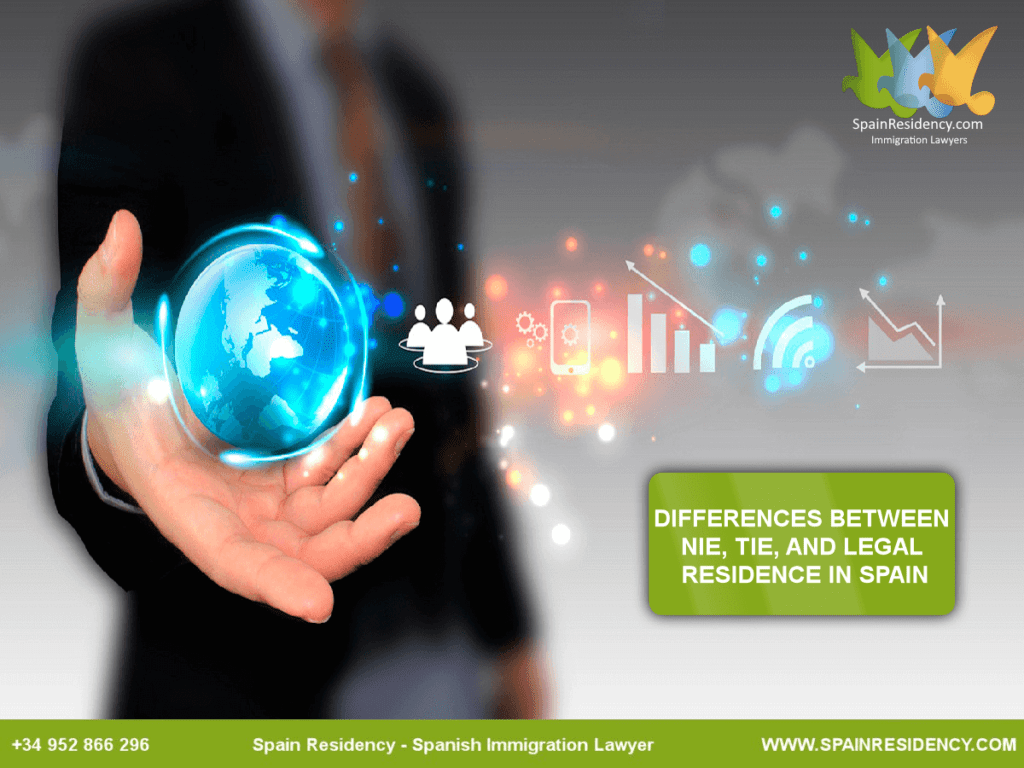The following terms can be confused: diferences between NIE, TIE, and LEGAL RESIDENCE in Spain, which can sometimes undestoord as being the same. But they are not the same.
What is the difference between TIE and NIE? Can I work if I have an NIE? Is the residence card the same as the NIE? These are some of the questions you ask us through our advisory phone line and our social networks. That’s why in this article we clarify all doubts for you.
Menu:
In this post we cover the following: (click any section to see its content)
The differences between NIE, TIE, and LEGAL RESIDENCE in spain.
- FOREIGNER IDENTIFICATION NUMBER (NIE) »
- FOREIGNER IDENTITY CARD (TIE) »
- LEGAL RESIDENCE IN SPAIN »
- ALL TYPES OF RESIDENCY AVAILABLE IN SPAIN »
- SCHEDULE AN APPOINTMENT WITH A SOLICITOR »
FOREIGNER IDENTIFICATION NUMBER:
The NIE, “Numero Identificación Extranjero“, is the Foreigner Identification Number (only the number), and it administratively identifies an individual with the Spanish state authorities. It usually starts with X or Y and will accompany us throughout our life until, if it happens, we become Spanish. A foreigner can have an NIE without having legal residence.
How can this be? When a foreign citizen has contact with the administration, they are registered in the database, that is, in the Central Register of Foreigners, and assigned an NIE regardless of their administrative situation.
FOREIGNER IDENTITY CARD:
The TIE , “Tarjeta Identidad Extranjero” is the plastic card, that is, the physical card, the Foreigner Identity Card, the physical document that contains its holders identification data, their photo, their address, NIE number, and type of authorization for their stay or residence in Spain.
LEGAL RESIDENCE IN SPAIN:
A persons legal residence or legal stay status (these are not the same) certify that its holder can live or stay in Spain legally. Depending on the type of residence, it may be permitted to work or not.
Legal residence in Spain is determined, in most cases, by an administrative resolution, granting that legal residence.
When a foreign citizen from a non-EU country wants to live in Spain, they need to apply for a residence permit or authorization. At that moment, and depending on their case, they will need to process one authorization or another.
ALL TYPES OF RESIDENCY AVAILABLE IN SPAIN:
- Golden-Visa Spain (Spain citizenship by investment)
- Non-Lucrative visa Spain (Spain visa non lucrative)
- Self-Employed visa Spain (self employed expats in Spain)
- Digital-Nomad visa Spain (remote worker in Spain)
Please see-here our video-blog with options and legal-advice to obtain residency in Spain.
Remember that immigration procedures and immigration regulations change regularly, so it’s crucial to stay updated with the latest information from reliable sources. If you have specific questions or concerns about your situation, it’s advisable to consult with immigration authorities or legal professionals specializing in immigration matters, to do this, please click-here »
DO YOU REQUIRE ASSISTANCE TO APPLY FOR RESIDENCY IN SPAIN?
We are a Spanish Solicitor and assist our clients with all types Spanish legal processes.
Permanent residency is obtained after 5 years of Spanish Residency through Self-Employed Residency, Digital-Nomad, Non-Lucrative Residency or Golden-Visa. This followed by 5 years as a permanent resident in Spain and means you can then obtain Spanish Citizenship with a Spanish Passport.


